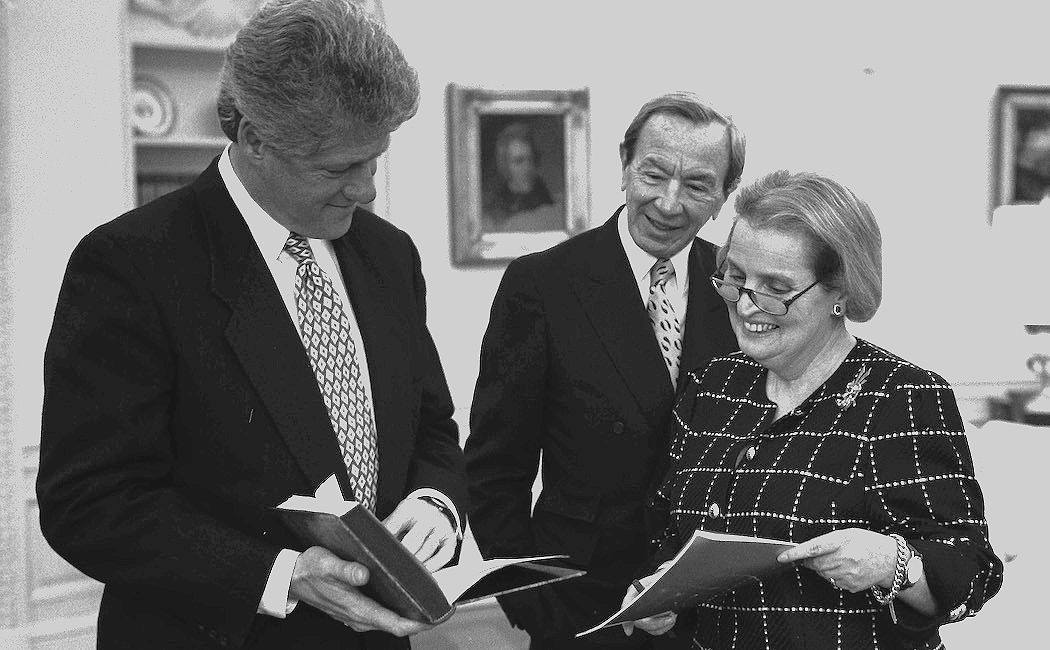Albright remembered as “pathbreaker” by TU expert
Pioneering former secretary of state Madeleine Albright shaped 21st century diplomacy
March 24, 2022

When former U.S. Secretary of State Madeleine Albright died March 23, she was remembered by colleagues as a trailblazing diplomat who helped shape foreign policy for generations.
Albright was the first woman to hold that position. President Joseph Biden called her, “a force for goodness, grace and decency—and for freedom. Hers were the hands that turned the tide of history.” Fellow former Secretary of State Hillary Clinton, said of her predecessor: “So many people around the world are alive and living better lives because of her service.”
As Towson University and the nation marks Women’s History Month in March, Albright’s legacy is being discussed by scholars such as Alison McCartney, a political science professor and Faculty Director of the Honors College
“She was a pathbreaker,” McCartney says. “The first female Secretary of State, Albright made it clear in everything she did that women not only belonged at the table but at the head of that table.”
McCartney, whose expertise includes European politics; German, Polish and Russian foreign policy; the European Union; and civic engagement, answered questions about Albright’s career.
Secretary Albright served during the years after the end of the Cold War. How daunting was her task not just in Europe but across the globe?
She was working in uncharted waters. When she began her term as U.S. ambassador to the United Nations, no one knew what the post-Cold War world would look like generally, meaning whether it would be time of peace, stability, prosperity or security or specifically, meaning who our continuing allies, friends and foes would be. We didn't know what issues would emerge from beneath the Cold War foundation, which had sidelined some conflicts and created new ones. For example, new states of Armenia and Azerbaijan emerged and immediately went into a devastating war over borders and old grievances, not to mention the enormous problems in what is now the former Yugoslavia.
What would you say her diplomatic style was?
Albright was very practical and at ease with people from a wide variety of cultures. Given her own background, which she later discovered included Jewish heritage, this was perhaps to be expected but not every high-ranking diplomat is so pragmatic yet personable. She enjoyed working with people, and that comfort came through. Her small physical stature went unnoticed by many because she was also quite forthright and didn't hesitate to register her well-informed opinions.
Where did she succeed, and what were her struggles as Secretary of State?
Well, this is a tricky question, as many of these situations are ongoing. She ardently supported the bombing of Serbian troops in Kosovo and stated: "I take full responsibility...for believing it was essential for us not to stand by and watch what Milosevic was planning to do. We cannot watch crimes against humanity." Kosovo's independence is still questioned in some states, though the area has been largely peaceful since she completed her term. One other key achievement—depending on where you sit—was the expansion of NATO in 1999 to include Poland, the Czech Republic and Hungary. Certainly, this move was celebrated in these countries, though it stoked resentment in Russia, especially as it spurred another round of expansion in later years. But I propose that including these countries in NATO was a good move to secure their and U.S. interests.
[Regarding] struggles—well, Iraq still isn't at peace, and North Korea has advanced its nuclear weapons program, but no one leader can solve every problem. Some problems take many, many years to work out, and some problems are beyond our capacity to solve.
Was there a particular moment during her diplomatic career that defined her?
The Kosovo campaign was termed by many as "Albright's war." She deeply regretted the lives lost there and in Iraq due to sanctions, but she saw a greater crime in what she termed genocide in Kosovo and overwhelming oppression and other crimes against humanity in Iraq.
Is there any wisdom of hers that you share with your students? If so, what is it?
She treasured democracy and human rights, the lack of which shaped her destiny. She understood that without the fundamental freedoms and rights that democracy provides, including the right to civilly agree to disagree, human peace and progress isn't possible.
When one looks at the global landscape and the work of Madeleine Albright, where are they likely to see her lingering impact today?
I see her as an ardent defender of freedom, a trailblazer for women in leadership and an example of how we must always learn from the past as we build a better future. Some termed her combination of policy and diplomatic style as the Albright Doctrine, meaning as Walter Isaacson wrote in Time, “A tough-talking, semi-muscular interventionism that believes in using force—including limited force such as calibrated air power, if nothing heartier is possible—to back up a mix of strategic and moral objectives.”
How much did she change the way the world looked at the United States?
Albright modeled how a strong woman could lead the most powerful country in the world on a global stage, and that's a pretty big change from how diplomacy had previously worked. Jeane Kirkpatrick was the first U.S. ambassador to the United Nations, and her example should not be underestimated. But Albright took the world another huge step forward in an age of increased communication. Young girls all over the world saw her on their TV sets, tangling with the worst leaders who sought to oppress their people as she fought for their rights. Those images of a diminutive woman speaking to them and their futures were priceless pieces of diplomacy, showing that America stood for women as equal leaders in global politics.
Media interested in speaking with TU faculty experts can contact Matt Palmer at mpalmer@towson.edu.